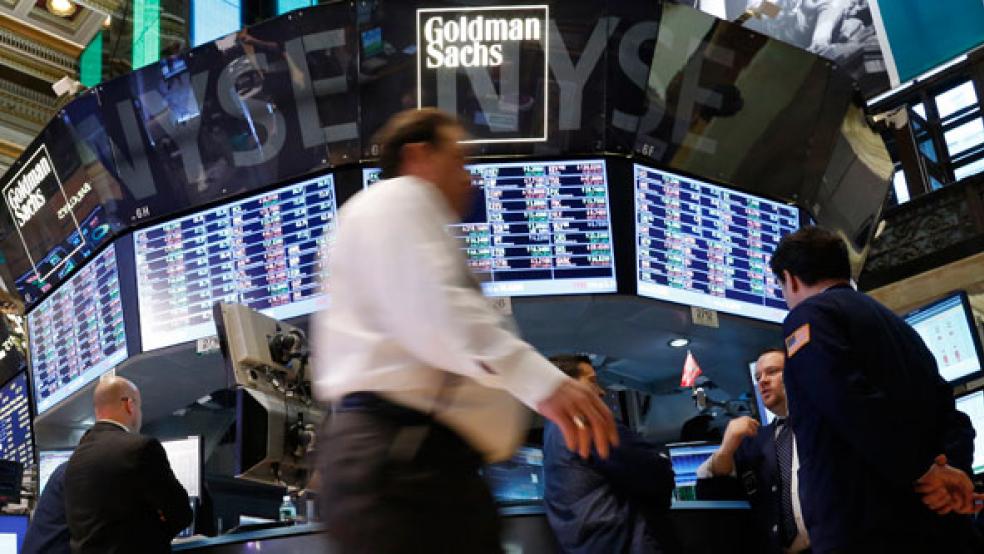Whether it really is all about the weather will be the challenge for markets, as another cold air blast descends on North America in the week ahead.
Earnings and comments from retailers such as Home Depot, Macy's and Target, as well as new home sales and pending home sales data, could offer more insight into how freezing temperatures, ice storms and snow have affected consumers and the economy. There are also durable goods and consumer confidence data.
Related: Is Poor Forecasting the Achilles Heel of Economics?
The biggest event will be Thursday's appearance by Fed Chair Janet Yellen before the Senate Banking Committee to provide testimony postponed because of weather. Traders will be watching to see if there is any change in her position that the weak employment data could be a result of weather.
The latest cold weather blast, moving first into the Plains states, is likely to add to the murky economic picture, which is already making it difficult for stocks to advance. Yet stocks have not sold off as report-after-report misses the mark, including a 16 percent decline in housing starts this past week. "It looks like the market is ignoring the data. I would argue the market is not ignoring the data," said Binky Chadha, chief global strategist at Deutsche Bank. The market has been supported by corporate buybacks, totaling about $400 billion annually.
"Because of the buybacks, the trend is up. … The question is all about when the macro data picks up," he said. "We subscribe to it's the weather. With a lag, you're going to see a move up in the data, and the market is basically waiting for the confirmation."
Markets area also watching the tentative truce in Ukraine and the outcome of the G-20 meeting in Australia this weekend.
Related: Russian Ties to Ukraine Go Much Deeper Than Gas
Stocks were largely flat the past week. The Dow fell 0.3 percent to 16,103, and the S&P 500 was down 0.1 percent at 1,836. Nasdaq was up 0.5 percent at a new 13-year high of 4,263, but the small-cap Russell 2000 led the pack, up 1.3 percent to 1,164. Traders are focused on whether major stock indexes can regain their highs, with the S&P just 12 points off its January closing high.
Defensive sectors (utilities and health care) that have outperformed this year were the leaders again this past week. That has sparked debate about whether the market can move ahead before different leadership takes over.
"If the equity market is going to go up because there's more confidence in growth and growth rebounds, rates are going to go up and bonds will underperform, and the bond-like sectors in the S&P—utilities, staples—will underperform," Chadha said.
Utilities, which gained only 8.75 percent last year, is up 6.3 percent so far in 2014. Health care has risen 5.8 percent, but other leaders from last year, including consumer discretionary and industrials, are both down more than 2 percent. Consumer discretionary stocks were up 40 percent last year. The sector, which includes retail, is still unattractive to some analysts concerned about earnings bumps.
Technology was down about half a percent for the week, and it's the only major S&P sector other than utilities and health care that is positive for the year.
Thomas Lee, JPMorgan chief U.S. equity strategist, expects the market leadership to change soon and for cyclicals to start to outperform, led by tech and materials. "I can see why there's a debate about it," he said. "I do think a lot of it's a misconception. ... Growth is going to be pretty strong in the second half because of the consumer ... weather played a role," he said. "Not only is the consumer going to play a role in the second half [rebound] because of lower gas prices … but corporate spending is going to play a role."
Related: Will Housing Rebound After This Woeful Winter?
Lee said the jump in negative economic surprises, tracked by a widely watched Citigroup index, is a sign that cyclicals could be getting ready to turn. "When it gets too negative, it means the data coming in is on the negative side and is missing expectations," he said. "By the time it gets to that point, the cyclically sensitive groups are already sold off. It is contrarian, but it is also telling us the bad news is baked in by then."
Dick Hoey, chief economist at Bank of New York Mellon, said not only the weather has been playing havoc with the data.
"I think there's a second factor. We're in an inventory correction," he said. "We don't have a collapse in demand. We just have an overshoot in inventory accumulation. There are two kinds of inventory corrections. One is when demand collapses, and there's a huge buildup of excess inventory, but the second kind is when inventory accumulation has been running too high and it has to just slow down. And I think it's the second kind of inventory adjustment that is going on in addition to the weather. ... They're both temporary."
Hoey said even though housing data is weak, the housing market is still in reasonably good shape and that sales should pick up in the spring selling season. Lower mortgage rates should help, and buyers may want to jump in before rates rise.
Traders are also watching how the Fed reacts to economic data. The central bank has indicated in speeches and in the minutes of its last meeting that it intends to move forward with paring its bond-buying program. Yellen has said jobs data may have been skewed by weather.
"What's interesting to me is how the Fed is fading both quantitative easing and forward guidance," Hoey said.
It's clear that hawkish members of the Fed would revolt if the tapering of QE were slowed, and the Fed appears committed to tapering. It has targeted 6.5 percent unemployment as a level to begin to consider raising short-term rates, but officials have said that number is not a trigger. In the recent release of minutes, the Fed did nothing to change or remove the target, and Hoey sees that as a sign of a less dovish body.
"The fact they didn't change the economic threshold of 6.5 percent unemployment, even though they are at 6.6—they are basically backing away from the 6.5 percent economic threshold," he said. "They are backing away from the specificity of the economic threshold for forward guidance."
Besides data and earnings, if the coming week is like the past two, it should see some merger activity. After both major deals of the past week—Facebook's $19 billion bid for WhatsApp and Actavis' $25 billion bid for Forest Labs, the stocks of the acquirers rose.
That trend is relatively recent, and according to Thomson Reuters, the acquirer's stock rose 68 percent of the time in the top 25 deals of the past year.
"What it's saying is the market is rewarding companies that are looking for growth, whether they do it organically or by buying it," Chadha said. "Relative to history, it is unusual, but it speaks to the theme that the equity market is sensitive to growth and it's willing to pay a premium for it."
More traditional is that the buyer's stock sells off on a deal announcement, as investors worry they are diluting their shares or overpaying for an asset.
Monday
Earnings: EOG Resources, Solar City, Tenet Healthcare, Vornado Realty, Oneok, Frontier Communications, Atlas Energy, HSBC
8:58 a.m.: Services PMI
10:30 a.m.: Dallas Fed survey
Tuesday
Earnings: Home Depot, Macy's, Toll Brothers, Boston Beer, First Solar, Chicago Bridge, Dreamworks Animation, Solar Capital, Sanderson Farms, Sempra Energy, American Tower, Bank of Montreal, Domino's Pizza, Expeditors International, Weatherford International
9:00 a.m.: S&P/Case-Shiller home prices
9:00 a.m.: FHFA home prices
10:00 a.m.: Consumer confidence
10:00 a.m.: Richmond Fed survey
1:00 p.m.: $32 billion 2-year note auction
Wednesday
Earnings: Target, J.C. Penney, TJX, AB InBev, Abercrombie and Fitch, AES, Barnes and Noble, Cablevision, Chesapeake Energy, Dollar Tree, Eaton Vance, Joy Global, Embraer, Caesar's Entertainment, Noodles and Co., Newfield Exploration, Royal Bank of Canada, Continental Resources, Vale, L Brands
10:00 a.m.: New home sales
11:30 p.m.: $12 billion 2-year floating-rate note auction
12:00 p.m.: Boston Fed President Eric Rosengren
1:00 p.m.: $35 billion 5-year note
7:30 p.m.: Cleveland Fed President Sandra Pianalto
Thursday
Earnings: Gap, Best Buy, Kohl's, United Health Services, Chico's FAS, Monster Beverage, Decker's Outdoor, Luxottica Group, Mylan Labs, Ocwen, Wendy's, Rowan Cos, Leap Wireless, Fortress Investment, Mentor Graphics, KBR, Telefonica, Windstream, MBIA, Salesforce.com, Ross Stores, Sotheby's, Southwestern Energy, Sprouts Farmers Market
8:30 a.m.: Weekly jobless claims
8:30 a.m.: Durable goods
10:00 a.m.: Fed Chair Janet Yellen testifies before Senate Banking Committee
1:00 p.m.: $29 billion 7-year note auction
3:15 p.m.: Atlanta Fed President Dennis Lockhart
3:15 p.m.: Kansas City Fed President Esther George
Friday
Earnings: Liberty Media, Iron Mountain, 3-D Systems, NRG Energy, Seadrill
8:30 a.m.: Real GDP (Q4 advance)
9:45 a.m.: Chicago PMI
9:55 a.m.: Consumer sentiment
10:00 a.m.: Pending home sales
3:15 p.m.: Fed Gov. Jerome Stein and Minneapolis Fed President Narayana Kocherlakota on a panel
This article originally appeared in CNBC.
Read more at CNBC:
Art Cashin: 'Stampede buying' or 'severe pullback'
Stocks resist pull of lousy US data
Fed missed the recession, but acted quickly after





